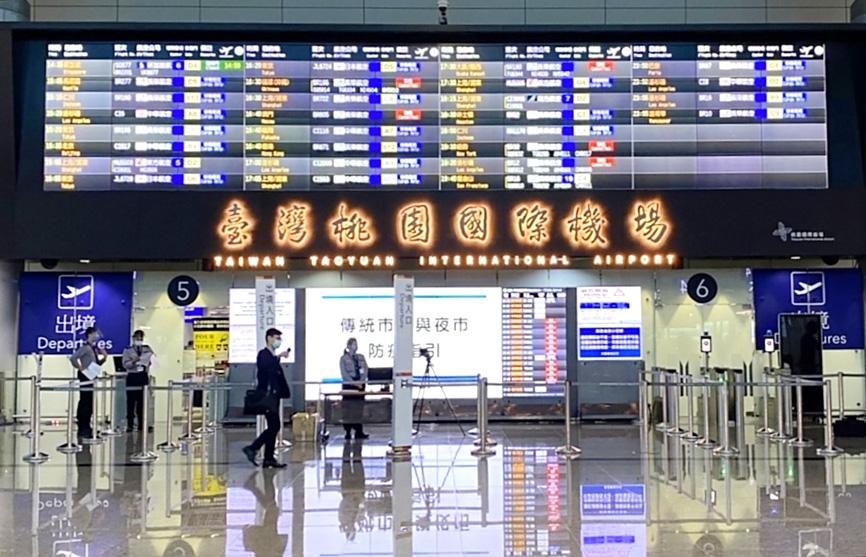The European Chamber of Commerce Taiwan (ECCT) yesterday urged the government to speed up energy transformation, attract and retain talent, and enhance conditions for developing innovative technologies.
Taiwan has navigated the COVID-19 pandemic well, and the economy has benefited from the acceleration of digitalization and a shift to remote working, but the nation needs a different strategy now, said the chamber, which released its annual position yesterday.
“While other countries are opening up, Taiwan’s continued isolation risks leaving it behind in the contest for international talent, trade and investment,” ECCT chairman Henry Chang (張瀚書) said.

Photo courtesy of Taoyuan International Airport Corp
Border restrictions should be phased out gradually, starting with a pathway for business-critical positions rather than a case-by-case review process, the chamber said.
The government should establish clear entry criteria to allow businesses to sustain their operations and facilitate talent flow, it said.
Taiwan was seen as a relatively safe haven during the pandemic, which helped attract overseas Taiwanese and foreign talent to Taiwan, it said, adding that this advantage would soon be gone.
Changes in Taiwan’s labor laws could help by exempting remote workers from the requirement to record working hours and attendance records, and create a new category of workers that is neither an employee nor an independent contractor, the paper said.
Authorities should also lower thresholds for the Employment Gold Card scheme, grant three-year work permits to all qualified foreign professionals and introduce 90-day business visas for foreign professionals, rather than requiring them to go through the lengthy process of applying for a work permit, it said.
In addition, the ECCT welcomed the government’s commitment to a net-zero target by 2050 and advised it to develop a roadmap for energy transformation in collaboration with all stakeholders.
Currently, government agencies operate in silos without due consideration of the big picture and how their actions might hamper those of others, the chamber said.
“Cross-ministerial leadership and coordination are essential to ensure a smooth energy transformation,” it said.
The roadmap should adopt concrete annual targets for the power sector, industry, mobility and buildings, the chamber said.
Taiwan also boasts some of the world’s best conditions for developing wind and solar energy, but progress toward tapping both sources has been slow, owing to local content requirements and red tape, it said.
Authorities should stop adding to already tough-to-meet local content requirements, and instead streamline procedures for renewable energy projects, it said.

The US dollar was trading at NT$29.7 at 10am today on the Taipei Foreign Exchange, as the New Taiwan dollar gained NT$1.364 from the previous close last week. The NT dollar continued to rise today, after surging 3.07 percent on Friday. After opening at NT$30.91, the NT dollar gained more than NT$1 in just 15 minutes, briefly passing the NT$30 mark. Before the US Department of the Treasury's semi-annual currency report came out, expectations that the NT dollar would keep rising were already building. The NT dollar on Friday closed at NT$31.064, up by NT$0.953 — a 3.07 percent single-day gain. Today,

‘SHORT TERM’: The local currency would likely remain strong in the near term, driven by anticipated US trade pressure, capital inflows and expectations of a US Fed rate cut The US dollar is expected to fall below NT$30 in the near term, as traders anticipate increased pressure from Washington for Taiwan to allow the New Taiwan dollar to appreciate, Cathay United Bank (國泰世華銀行) chief economist Lin Chi-chao (林啟超) said. Following a sharp drop in the greenback against the NT dollar on Friday, Lin told the Central News Agency that the local currency is likely to remain strong in the short term, driven in part by market psychology surrounding anticipated US policy pressure. On Friday, the US dollar fell NT$0.953, or 3.07 percent, closing at NT$31.064 — its lowest level since Jan.

The New Taiwan dollar and Taiwanese stocks surged on signs that trade tensions between the world’s top two economies might start easing and as US tech earnings boosted the outlook of the nation’s semiconductor exports. The NT dollar strengthened as much as 3.8 percent versus the US dollar to 30.815, the biggest intraday gain since January 2011, closing at NT$31.064. The benchmark TAIEX jumped 2.73 percent to outperform the region’s equity gauges. Outlook for global trade improved after China said it is assessing possible trade talks with the US, providing a boost for the nation’s currency and shares. As the NT dollar

The Financial Supervisory Commission (FSC) yesterday met with some of the nation’s largest insurance companies as a skyrocketing New Taiwan dollar piles pressure on their hundreds of billions of dollars in US bond investments. The commission has asked some life insurance firms, among the biggest Asian holders of US debt, to discuss how the rapidly strengthening NT dollar has impacted their operations, people familiar with the matter said. The meeting took place as the NT dollar jumped as much as 5 percent yesterday, its biggest intraday gain in more than three decades. The local currency surged as exporters rushed to